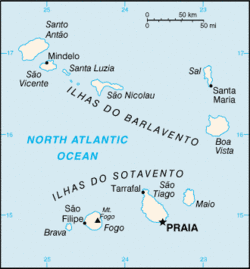Welcome to the Virtual Education Wiki ~ Open Education Wiki
Cape Verde: Difference between revisions
(added some more detail and refs - and cat coi) |
|||
| Line 8: | Line 8: | ||
== Cape Verde in a nutshell == | == Cape Verde in a nutshell == | ||
[[Image:Cape_Verde.gif|right|thumb|250px]] | |||
The Republic of ''Cape Verde'' (Portuguese: Cabo Verde), is a republic located on an archipelago in the [[Macaronesia]] ecoregion of the North Atlantic Ocean, off the western coast of [[Africa]]. The previously uninhabited islands were discovered and colonized by the [[Portuguese]] in the fifteenth century (though there may have been earlier discoveries), and attained independence in 1975. | The Republic of ''Cape Verde'' (Portuguese: Cabo Verde), is a republic located on an archipelago in the [[Macaronesia]] ecoregion of the North Atlantic Ocean, off the western coast of [[Africa]]. The previously uninhabited islands were discovered and colonized by the [[Portuguese]] in the fifteenth century (though there may have been earlier discoveries), and attained independence in 1975. | ||
| Line 17: | Line 18: | ||
For more information see the wikipedia article on [http://en.wikipedia.org/wiki/Cape_Verde Cape Verde]. | For more information see the wikipedia article on [http://en.wikipedia.org/wiki/Cape_Verde Cape Verde]. | ||
== Cape Verde education policy == | == Cape Verde education policy == | ||
Revision as of 09:29, 3 September 2009
Since it is a small and remote island archipelago, the information here on Cape Verde is reduced to the minimum for the purposes of Re.ViCa.
Partners situated in Cape Verde
None.
Cape Verde in a nutshell
The Republic of Cape Verde (Portuguese: Cabo Verde), is a republic located on an archipelago in the Macaronesia ecoregion of the North Atlantic Ocean, off the western coast of Africa. The previously uninhabited islands were discovered and colonized by the Portuguese in the fifteenth century (though there may have been earlier discoveries), and attained independence in 1975.
Cape Verde is named after the original Portuguese form for Cap Vert (Cabo Verde, Green Cape) in Senegal, the westernmost point of continental Africa. The country's name can be pronounced many ways in English. Cape is pronounced like the article of clothing. Verde is generally pronounced to rhyme with "bird" or "Herd," though rhyming with "bear D" or "bear day" are also heard. "Cabo" is not used in English.
The population of Cape Verde is estimated as 423,000.
The main language is Portuguese but Crioulo (a mixture of archaic Portuguese and African words) is also spoken.
For more information see the wikipedia article on Cape Verde.
Cape Verde education policy
Omitted.
Cape Verde education system
Omitted.
Higher education
There are two universities in Cape Verde:
- University of Cape Verde
- Jean Piaget University of Cape Verde
The University of Cape Verde (Portuguese: Universidade de Cabo Verde) was formed in 2006 by the merging of two colleges, working in different places:
- ISE (Instituto Superior de Educação) located in Praia
- ISECMAR (Instituto Superior de Engenharias e Ciências do Mar) located in Mindelo
In 2007 a third school officially joined the others:
- INIDA (Instituto Nacionai de Investigação e Desenvolvimento Agrário) located in São Jorge dos Órgãos
(Material taken from http://en.wikipedia.org/wiki/University_of_Cape_Verde.)
The University of Cape Verde web site is at http://www.unicv.edu.cv.
The Jean Piaget University of Cape Verde (Portuguese: Universidade de Jean Piaget de Cabo Verde) is located in the capital city of Praia on Santiago, with a smaller second location in Mindelo on São Vicente. Until the 2007-2008 academic year, it had been Cape Verde's only university. Geographically it is the westernmost university in Africa. The main location is in the northwestern part of Praia. Several campuses are planned be added throughout the archipelago. The university is named after the famous French theorist Jean Piaget. It primarily serves Cape Verdeans, but there are students from the rest of Africa and Latin America as well. Jean Piaget University offers both undergraduate and graduate degrees, as well as continuing education courses. (Material taken from http://en.wikipedia.org/wiki/Jean_Piaget_University_of_Cape_Verde.)
Its web site is at http://www.unipiaget.cv.
Higher education reform
Omitted.
Administration and finance
Omitted.
Quality assurance
Omitted.
Cape Verde HEIs in the information society
Omitted.
References
Wikipedia
- http://en.wikipedia.org/wiki/Cape_Verde Cape Verde
Others
To show that one should not make value judgements about remote universities, the reader's attention is drawn to the following paper:
Sousa, S., Hudson, B. & Lamas, D. (2003). Understanding e-Learning: Towards an Understanding of Trust and Performance in On-line Distance Learning. In C. Crawford et al. (Eds.), Proceedings of Society for Information Technology and Teacher Education International Conference 2003 (pp. 2511-2512). Chesapeake, VA: AACE. For abstracting details see http://www.editlib.org/index.cfm?fuseaction=Reader.ViewAbstract&paper_id=18485.
The authors are Sonia Sousa, Universidade Jean Piaget de Cabo Verde, Cape Verde; Brian Hudson, Sheffield Hallam University, UK; David Lamas, Universidade Jean Piaget de Cabo Verde, Cape Verde. The abstract notes:
- This paper describes a study being conducted on a graduate level on-line distance education course at an African university which aims to explore the relation of trust and performance in such environments. This study goal is to understand the main aspects of that relation with the purpose of determining which trust factors could most influence and help maximise the level of trust in an on-line distance learning class. This line of research builds on the belief that the trust that students put in their on-line teachers is the common denominator of several related problems such as motivation, retention, technology difficulties, the need for interacting and communicating with the participants and the need for a trustful on-line distance learning environment
See also: Azores, Madeira and Portugal.
